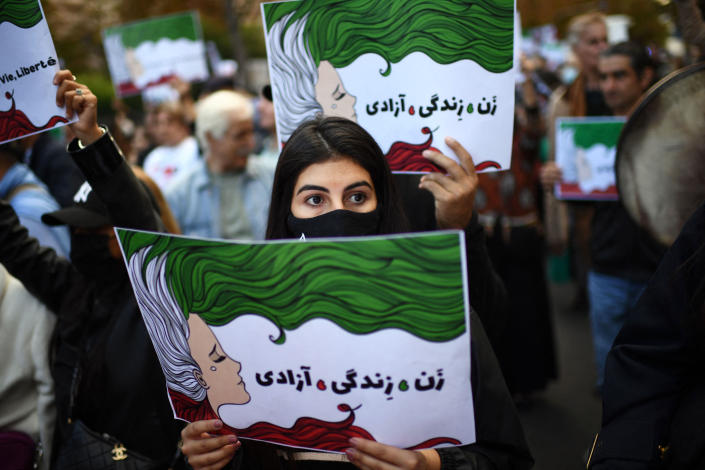Iran has accused Western leaders of trying to “violate its sovereignty” by making comments supporting protesters angry over the death of a young woman who had been detained by the country’s morality police.
“In the recent riots, the political leaders of America and Europe, their media, exploited a tragic incident under investigation and with the slogan of supporting the rights of the Iranian nation,” an Instagram statement by an Iranian Foreign Ministry spokesperson read Monday. “They did all they could to support the riots.”
“Attempts to violate Iran’s sovereignty will not go unanswered,” Nasser Kanani’s post added.
The warning came amid widespread protests triggered by the death of Mahsa Amini, 22, and increasing international support for the demonstrations demanding wider freedoms and women’s rights.
On Friday, the Treasury Department issued guidance expanding the range of internet services available to Iranians despite U.S. sanctions on the country.


Josep Borrell, the European Union’s foreign policy chief, has said Iran should “immediately stop the violent crackdown on protests and ensure internet access.” He also called for information on the number of people killed and arrested, and an investigation into “the killing of Mahsa Amini.”
The protests have blossomed into anti-government rallies across the nation, drawing crowds onto the streets across the country and calls for a nationwide strike on Monday and Wednesday.
Women across Iran have been protesting the country’s mandatory dress codes, with videos posted online showing women burning their hijabs and cutting their hair on public streets.
Police said Amini died on Sept. 16 after falling ill and slipping into a coma days earlier as she waited with other women held by the morality police, which enforce the Islamic Republic’s strict rules requiring women to cover their hair and wear loose-fitting clothes in public.
Officials have said she died from a pre-existing condition and had a heart attack and say an investigation is underway. Her family denies that she had a pre-existing condition and says witnesses told them she had been beaten by police.


Solidarity protests beyond Iran’s borders also took place over the weekend, with rallies in cities across Europe and the U.S. in support of the protesters. Violent clashes erupted Sunday between protesters and police outside the Iranian Embassy in London.
The Treasury Department on Thursday sanctioned the country’s morality police and seven senior security officials.
Kanani’s tough talk came a day after Tehran summoned the British and Norwegian ambassadors over what it slammed as hostile media coverage by U.K.-based Persian outlets and interference by Norwegian parliament speaker Masud Gharahkhani, who voiced support for the protesters, according to Reuters.
The death toll from the ongoing protests has risen to 41, according to the latest available figures by state-controlled IRINN television on Sunday. NBC News has not confirmed this report.
Deaths, arrest figures and injuries during the protests are difficult to ascertain, as authorities continue to block access to the internet in parts of the country. Rights group Hengaw told NBC News on Monday the internet continues to be limited in Kurdistan, citing local sources.
Haleh Esfandiari, the director emerita of the Middle East program at the Wilson Center, said Iranian authorities will deploy whatever force needed to quell the unrest.
“The regime feels threatened, and we know from previous occasions … it is willing to use any means to end such protests,” Esfandiari said.
“The protests pose a genuine threat in the sense that they make clear that a majority of the people have reached the end of their patience and no longer are willing to put up with the kind of government to which they have been subjected,” she added.
This article was originally published on NBCNews.com




